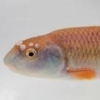I suppose what it really boils down to is the purpose for any given name...
Where this group gets caught is between the crossfire of taxonomists who are working out hypotheses (not truth) among relationships between populations of similar fish, and the fact that native fish aquaria appeals to people who like to "know" things... The combination of both is particularly harrowing to those starting out on this adventure.
My advice is... Don't get caught up in the professional taxonomy unless it's your job. It's insanity to do so. It's the working end of science, and hypotheses will be test and retest, and can conclude different results depending on the interpreter and their reviewers. When science is working the best, it's subject to new evidence that can support or refute current hypotheses. It's a hypothesis. Did I say already?
However, I've just read three very interesting general examples of evolution that can be discussed with anyone, using names that can be expressed with meaning to anyone from ages 4 to 94. There's something to "redfin pickerel" and "grass pickerel" in multiple evolutionary senses... One name evokes a habitat of tannic waters of the Atlantic and Gulf Coasts, the other evokes the clear waters of the interior uplands of the Midwest, yet both are meso-sized burst predators living among vegetation. The names evoke a sense of imagination on behalf of the learner, and it would be a mistake to get them lost in the details of the story through the Mississippi Delta. It's a neat story to know both parts, the differences in habitats as they relate to the genes that are expressed, and the learner can feel smart by knowing the two population CENTERS (not the areas of dispute on the edges).
So if you want to be a professional ichthyologist, your purpose may be to keep track of the current state of these relationships... but for most of us, I think we will achieve a greater benefit in society by understanding WHY there are differences as names relate to taxonomy, and most of all by taking time to interpret the variation to the public in a way that's meaningful to anyone willing to listen.
Todd
Edited by farmertodd, 10 October 2011 - 10:36 AM.










